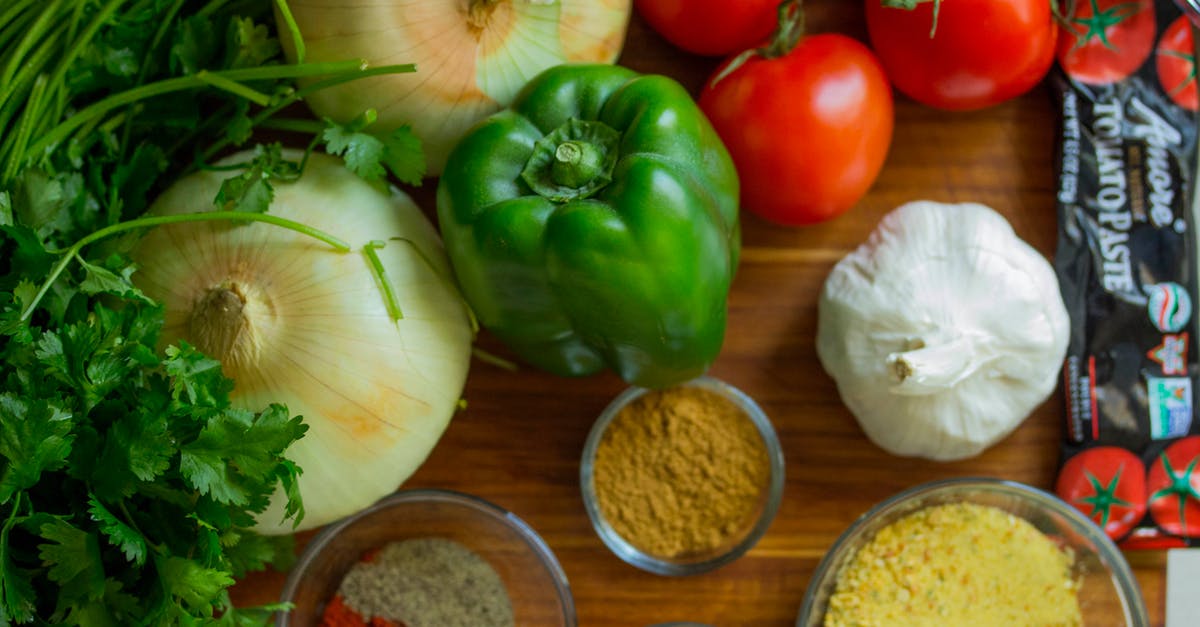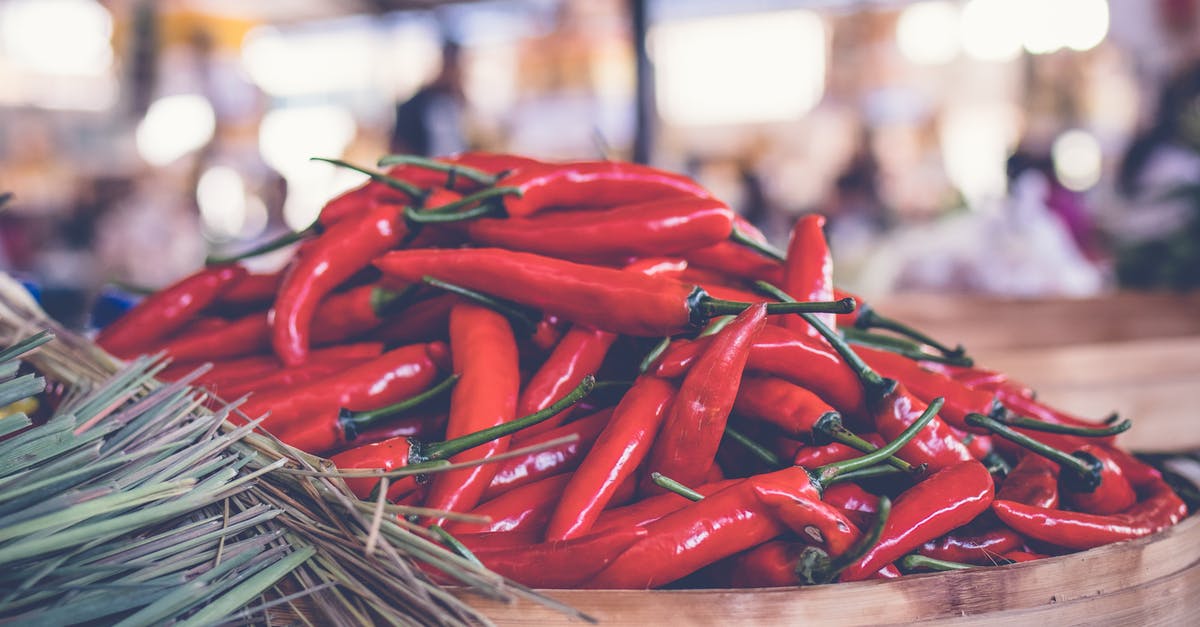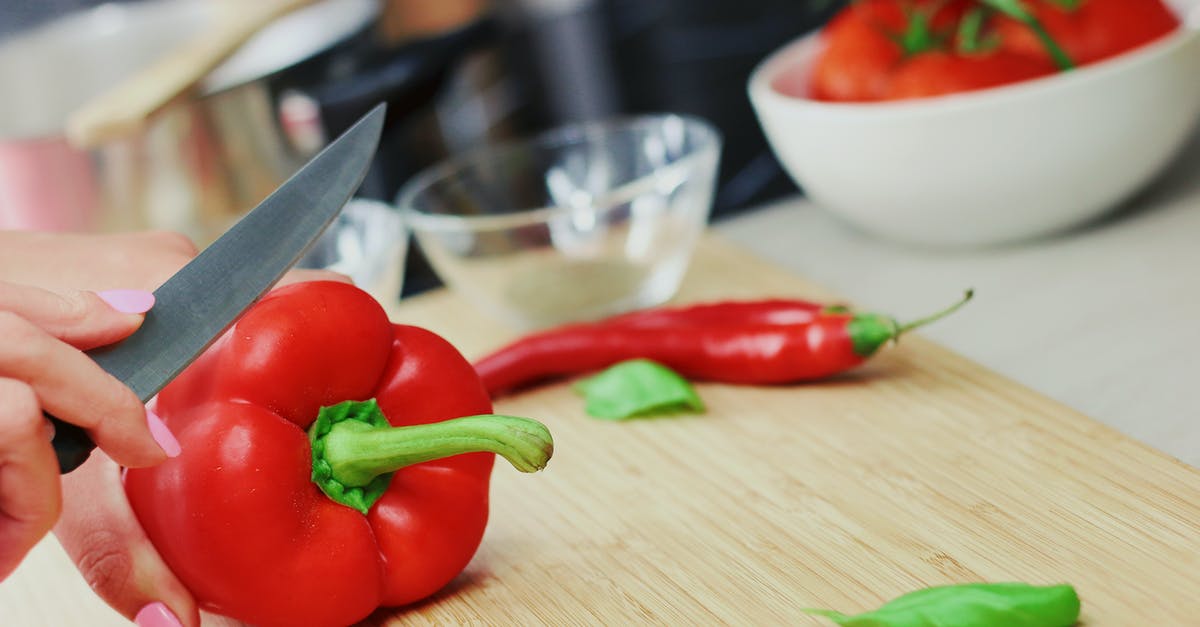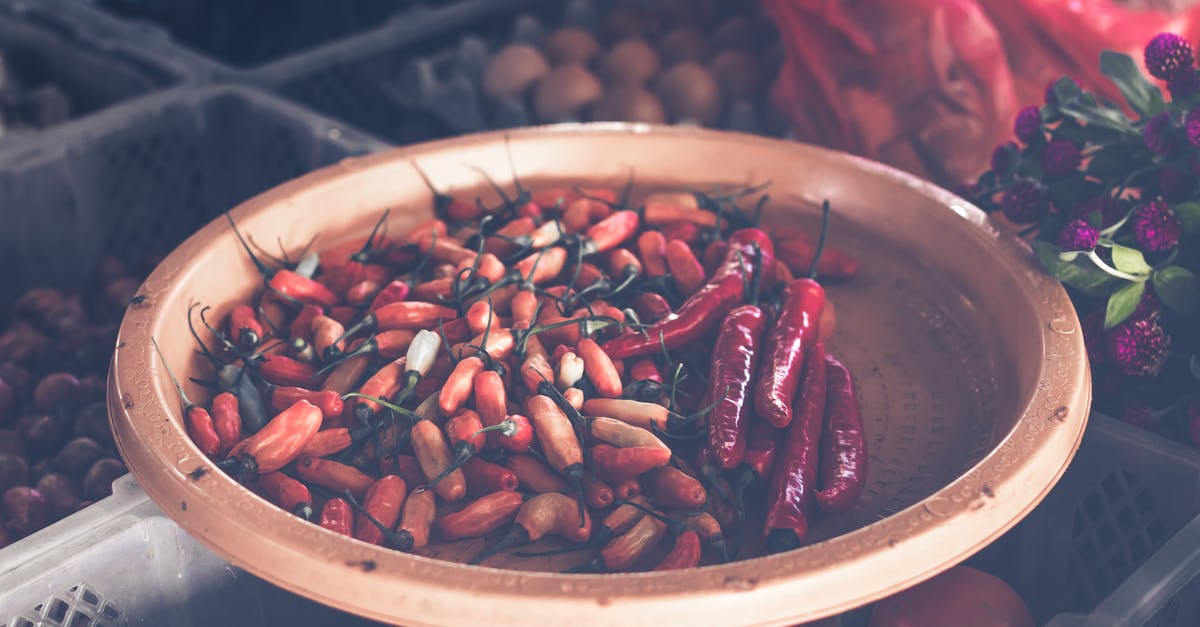Does chilli get milder with cooking?

I have made a tomato, onion and cannelini bean curry. I put a lot of chilli spice in it, perhaps too much. If I keep simmering it, will it get milder? I'm hoping it will cook into the (bland) beans.
Best Answer
You'll sometimes hear television cooking show hosts describe what they're doing as "cooking out" the paste. What they're actually doing is altering the flavor of the chili itself, not manipulating the level of capsaicin that was introduced. If you take a typical chili paste which has been combined with garlic and other things and then saute it in a fat, you will lower the level of heat that's tasted (and possibly take some bitterness out, depending on the chili and what's in the paste), but not lower the level that's actually ingested.
If you literally want to cook it out, put some sliced chili with nothing else in a searing hot pan, but make sure no one else is home or going to be home for a while, and wear a respirator. The capsaicin has nowhere to go and vaporizes as it burns (seriously, don't do that, if you did that in my kitchen I'd throw a live crab at you).
Various kinds of fat bond well with the capsaicin, essentially creating a sort of encasement. To demonstrate how this works, grab some sriracha and some cream. Mix in about half a tablespoon of sriracha to about 300 ml of cream, taste it. Now, simmer the cream a bit (about 3 - 5 minutes), take it off the heat, let it rest a few minutes and taste it again. The level of sriracha didn't change, what happened is the cream got its hands on the capsaicin that it contained. It'll continue to get milder the longer it sits. That's why a glass of milk can rescue you from atomic hot wings and why water just broadens the pain as it makes sure your whole palate gets a chance to taste it :) Beer just makes you care less about it.
Now, sugar has the remarkable quality of helping to hide heat with its mighty right of first refusal when it comes to your palate. The heat from the chili shows up and your palate says "what? I'm too busy with this sweet, I can only listen to a little of you". To see how that works, repeat the experiment again, but this time throw a teaspoon or so of confectioner's (or castor) sugar into the cream with the sriracha, along with an additional squirt or two (around 10 ml) of sriracha. That's why coconut milk works so perfectly in a curry.
The best bet for your recipe is finding a way to get some kind of fat into it. That could be coconut milk, fatty bacon, or whatever makes sense based on how you want to serve it. Then, optionally, sweeten it up a bit (also remember that citrus helps offset sweet, handy to keep that in mind when you're 'fixing' a dish) - some raisins sound like they'd work rather well with what you're doing. Maybe go with coconut milk and raisins, and thin it out with a bit of chicken stock if needed?
I really try to encourage people to take an hour and just experiment with ways you can alter and sort of control chili, because it is a lovely thing to cook with. Just remember, whatever you put in the pan initially ends up being eaten, you're just hiding a bit of that as you cook.
Pictures about "Does chilli get milder with cooking?"



How can I make my chilli more mild?
The capsaicin in chiles is what gives the peppers their burn. One of the best ways to counteract this chemical compound is by adding a dairy product: whole fat milk, heavy cream, yogurt, cheese, or sour cream. Even rich coconut milk can do the trick.How do you make chili a little less spicy?
In a chili, the easiest tool for dilution is simply to add more beef or beans but more tomato can be effective as well. If the chili is only a little too hot, consider diluting it by adding more liquid. Tomato juice, water or a stock can be effective for this purpose.Are chillies hotter when cooked?
Cooking your chili does make it spicier, up to a point. As you cook a chili, the chili breaks down, releasing more and more capsaicin.Does cooking hot peppers make them milder?
Cooking peppers makes dishes hotter because the peppers break down while cooking and releases more capsaicin into the dish. The spiciness is then spread out throughout the dish, so it gives the sensation of an overall spicier meal.Has anyone DIED from eating chillies? 🌶 | How To Cook That Ann Reardon
More answers regarding does chilli get milder with cooking?
Answer 2
From long cooking, the capsaicin could distribute throughout the food in a way that will make it more palatable, but the capsaicin content will not drastically change.
If this does not suffice: In a curry dish, heat is best made more palatable by mixing in an emulsified, fatty, rich component like coconut milk, cream, yoghurt (mind the proper technique here so you do not curdle the yoghurt. Also, mind acid balance.). Again, this will not reduce the capsaicin content in the pot, so if the hot food is not unpalatable but hard to digest, it is likely to stay that way.
Answer 3
No. It will not get milder with simmering. The nature of any spice is to seep into the dish directly proportional with the time. The more you cook it the more the intensity infused into the dish. Especially spices like chilli(any variety, and any form, whole or powder) and black pepper make the dish spicier the longer they stay in the dish, especially in water based dishes like curry or sauce. Its because they take their own time to get infused into the dish completely. So if you want to make the curry less spicy, add other ingredients proportionate to the chilli added. Like more tomatoes will work best. The tanginess goes well with the spice added , and adding a little more salt will bring the curry to a perfect balance. Definitely the spiciness will be reduced. If the curry calls for cream or milk , you can slightly increase the amount as well. The main goal is to bring harmony and balance to the dish. You know the ingredients well, so add or reduce those accordingly to achieve that. Hope it helps.
Answer 4
Exactly the opposite! Up to a point, boiling chili makes it hotter, due to the extraction of capsaicin from the grains/flakes of chili. This can happen even without boiling, such as refrigerating leftovers. You should always be cautious about letting something spicy sit, let alone cook longer.
That said, you should not boil it longer. Not only will you extract more capsaicin, you will extract other compounds (like piperine) which would contribute to it tasting even stronger. You will also reduce the overall volume, unless you continue adding water, which concentrates the flavor even more. And if you keep cooking it, it will turn to mush.
I have a few suggestions to deal with "it's too hot!":
- Add thickener. Corn starch, flour, and bean flour are options. Bean flour would be best for Indian food.
- Add more of whatever the bulk is. In this case, add more beans - precook them separately, get canned, whatever.
- Add dairy products. Milk, cream, and yogurt are effective at reducing spiciness. This doesn't work for all dishes but might for certain Indian bean dishes - see Dal Makhani. It would be preferable to add such towards the end of cooking, as it could actually contribute to making it spicier if added earlier.
A related anecdote. I make a lot of alcohol extracts of herbs and spices. I made one of Balinese long pepper once. One pepper cone in a small bottle of 50% vodka. Left it for a few weeks, then sipped it. That liquid remains the second spiciest thing I have tasted. Do not underestimate the amount of flavor chemicals you usually miss by it simply not being extracted.
Answer 5
If setting it aside for a day or two happens to be an option for this curry, (keeping it refrigerated and adhering to all food-safety guidelines of course) it will likely get less chili-hot all by itself. I know it seems counter-intuitive, but my family has always noticed how, especially in bean dishes, the spicy-heat diminishes in the left-overs as compared to the way the food burned our mouths the first meal we ate it. We have speculated that the chili compounds must seep into the beans somehow, distributing themselves throughout the food and remaining less concentrated in the liquid part of the dish, so we perceive the food as "less hot" in our mouths.
Answer 6
From my Indian cooking experience, if I put too much chilli spice I would add water and other little more other ingredient(Beans, meat etc) to match up the likeness I want.
The more you cook chilli extract will be mixed in that proportion and curry would become more hot.
Sources: Stack Exchange - This article follows the attribution requirements of Stack Exchange and is licensed under CC BY-SA 3.0.
Images: Angele J, Artem Beliaikin, JÉSHOOTS, Artem Beliaikin
